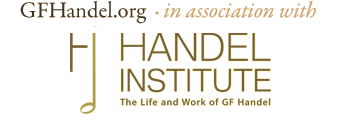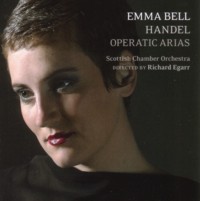Hot on the heels of Handel
aria recitals by Sandrine Piau (Naïve), Sarah Connolly (Coro), Renee Fleming
(Decca), Maria Riccarda Wesseling (Claves) and others, there is a danger
that Emma Bell might not be able to offer anything more substantial than a
showcase for her own voice. Emma Bell has gained a strong reputation for her
steely performances of the title-role in Rodelinda and has recently
sung Alcina in Berlin and recorded the role of Merab in Saul (under
Jacobs). But, to my ears, Emma Bell is not really a natural Handel singer
and too often makes runs intended to display agility and technique seem like
aggresive hard work. Compared to the finest Handel sopranos active at the
moment (Karina Gauvin, Dominique Labelle, Simone Kermes, Sandrine Piau,
Carolyn Sampson, Deborah York, Rosemary Joshua), Emma Bell’s powerful vibrato and
melodramatic intensity often seems at odds with Handel’s musical vocabulary.
At best, it might remind some of Joan Sutherland. That is by no means a bad
thing, but it might not be best suited to any given Handel role.
This is not a bad programme. It mixes a few popular
well-known warhorses alongside some less obvious contenders. It is good to
see somebody championing ‘D’estero all empio dite’ (from Amadigi),
even if it has been included on recitals by Jeni Bern and Simone Kermes (La
Maga Abbandonata on DHM). It is also good to see ‘Scherza in mar’ being
pushed to the forefront of the soprano repertory, although this performance
seems curiously pedestrian and lacks the defiant personality and heroism
that Simone Kermes captures so effectively on Alan Curtis’ recent recording
of Lotario. Here it seems rather like it could be an extract from one
of Leopold Hager’s recordings of early Mozart operas.
Two arias from Radamisto and ‘Tutta raccolta ancor’
(from Scipione) are among the best things here and prevent the
recital from becoming predictable and boring. It is difficult to justify yet
another outing for ‘Piangerò
la sorte mia (from Giulio Cesare) unless it is an exemplary and
beautiful performance. I do not find Emma Bell’s shaping of Handel’s melodic
writing to be particularly sympathetic or lovely, although others might
disagree or respond better to Bell’s undeniably full-frontal dramatic
attack.
The Scottish Chamber Orchestra is
well versed in playing 18th century music under Sir Charles Mackerras. They
provide neat and efficient accompaniment but do not become part of the drama
in the way that Les Talens Lyriques do on Sandrine Piau’s magnificent
recital. Richard Egarr brings out a lot of
appealing elements of Handel’s orchestral writing. While I remain undecided
about Emma Bell in Handel (her contribution to René
Jacobs’ Saul is much more vocally comfortable than her own Handel
recital is), I am certainly keen to hear Egarr’s forthcoming collaborations
with the Academy of Ancient Music and Harmonia mundi.




